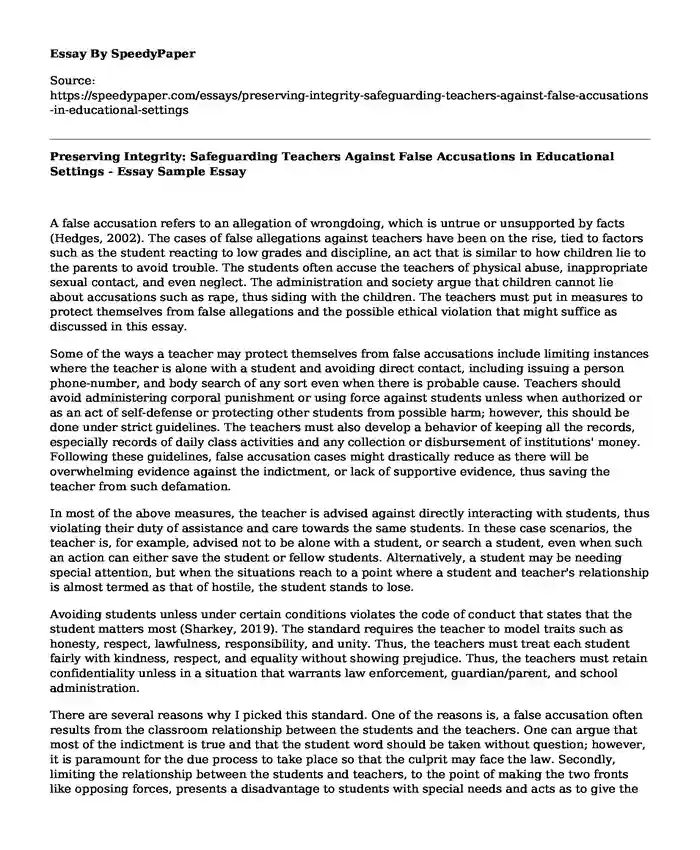A false accusation refers to an allegation of wrongdoing, which is untrue or unsupported by facts (Hedges, 2002). The cases of false allegations against teachers have been on the rise, tied to factors such as the student reacting to low grades and discipline, an act that is similar to how children lie to the parents to avoid trouble. The students often accuse the teachers of physical abuse, inappropriate sexual contact, and even neglect. The administration and society argue that children cannot lie about accusations such as rape, thus siding with the children. The teachers must put in measures to protect themselves from false allegations and the possible ethical violation that might suffice as discussed in this essay.
Some of the ways a teacher may protect themselves from false accusations include limiting instances where the teacher is alone with a student and avoiding direct contact, including issuing a person phone-number, and body search of any sort even when there is probable cause. Teachers should avoid administering corporal punishment or using force against students unless when authorized or as an act of self-defense or protecting other students from possible harm; however, this should be done under strict guidelines. The teachers must also develop a behavior of keeping all the records, especially records of daily class activities and any collection or disbursement of institutions' money. Following these guidelines, false accusation cases might drastically reduce as there will be overwhelming evidence against the indictment, or lack of supportive evidence, thus saving the teacher from such defamation.
In most of the above measures, the teacher is advised against directly interacting with students, thus violating their duty of assistance and care towards the same students. In these case scenarios, the teacher is, for example, advised not to be alone with a student, or search a student, even when such an action can either save the student or fellow students. Alternatively, a student may be needing special attention, but when the situations reach to a point where a student and teacher's relationship is almost termed as that of hostile, the student stands to lose.
Avoiding students unless under certain conditions violates the code of conduct that states that the student matters most (Sharkey, 2019). The standard requires the teacher to model traits such as honesty, respect, lawfulness, responsibility, and unity. Thus, the teachers must treat each student fairly with kindness, respect, and equality without showing prejudice. Thus, the teachers must retain confidentiality unless in a situation that warrants law enforcement, guardian/parent, and school administration.
There are several reasons why I picked this standard. One of the reasons is, a false accusation often results from the classroom relationship between the students and the teachers. One can argue that most of the indictment is true and that the student word should be taken without question; however, it is paramount for the due process to take place so that the culprit may face the law. Secondly, limiting the relationship between the students and teachers, to the point of making the two fronts like opposing forces, presents a disadvantage to students with special needs and acts as to give the students so much power as to disrespect the teacher.
An educator should follow several steps to avoid violating their code of conduct towards students. The educator should deal justly with each student and resolve issues such as discipline, following the state laws' strict guidelines, and the institution policy (Sharkey, 2019). Secondly, the teacher should maintain confidentiality unless when instructed otherwise by the law and avoid intentionally exposing the student's disparagement. Thirdly, the educator must initiate a constructive effort to protect the children from the environment detrimental to safety and learning (Sharkey, 2019). Lastly, when required, the educator must present unbiased information that is free of distortion and personal prejudice. When these requirements are upheld, The relationship between the students and the teachers will improve, thus strengthening their standard of care.
References
Hedges, L. E. (2002). False Accusations: Genesis and Prevention. American Journal of Psychotherapy, 56(4), 494–507. https://doi.org/10.1176/appi.psychotherapy.2002.56.4.494
Sharkey, C. (2019). Association of American Educators. Aaeteachers.Org. https://www.aaeteachers.org/index.php/about-us/aae-code-of-ethics
Cite this page
Preserving Integrity: Safeguarding Teachers Against False Accusations in Educational Settings - Essay Sample. (2023, Dec 29). Retrieved from https://speedypaper.net/essays/preserving-integrity-safeguarding-teachers-against-false-accusations-in-educational-settings
Request Removal
If you are the original author of this essay and no longer wish to have it published on the SpeedyPaper website, please click below to request its removal:
- Research Paper Sample on the Use of Music in Teaching and Learning
- Free Essay with a Nutrition Case Study
- Essay Example: Relationship to Language
- Article Review Essay: Stereotypes and Self-Perceptions of Physical Education Pre-Service Teachers
- Essay Example: Why I Want to Pursue an MBA
- Lessons from the Article - Free Essay Example
- The Health Informatics and Patient Safety. Essay Example
Popular categories





